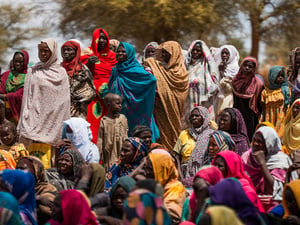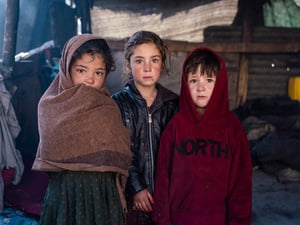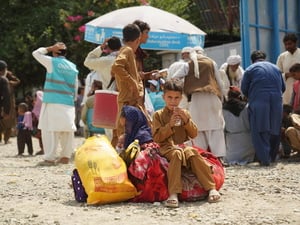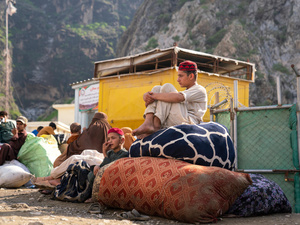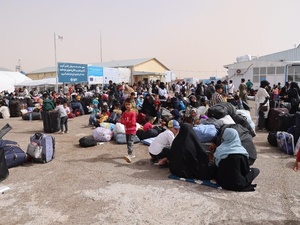Tajikistan urged to help stranded Afghans
Tajikistan urged to help stranded Afghans
UNHCR has urged the government of Tajikistan to admit up to 10,000 Afghans who are marooned on islands and peninsulas in the Pyandj River that marks the border between Afghanistan and Tajikistan.
The Afghans, who fled fighting in north-eastern Afghanistan between Northern Alliance troops and Taleban forces, have been stuck in the no-man's-land for weeks. They have been unable to reach safety inside Tajikistan, whose border is guarded by Russian troops under an agreement between Dushanbe and Moscow.
Aid workers from UNHCR and other agencies have visited some of the sites and report that the Afghans are living in extremely precarious conditions. Artillery fire from inside Afghanistan occasionally strikes the encampments. At least six people have been wounded, one of them seriously and in need of urgent treatment that is unavailable in the makeshift camps.
Mainly women and children, the 10,000 people include some armed ex-fighters of the Northern Alliance, which was driven from the northern Afghan city of Taloqan following recent fighting with the Taleban. Any ex-military elements would need to be disarmed before being allowed into Tajikistan as refugees.
"These Afghans, especially the women and children, have to be brought to safety so that they can be protected from sporadic shelling, the fast approaching winter and the danger of flooding," said Mustapha Djemali, the Geneva-based UNHCR director in charge of the region.
The Afghans are drinking water from the river and some are suffering from diarrhoea, dysentery, typhoid and malaria. UNHCR and other relief agencies have distributed relief aid, including blankets, clothing, plastic sheeting and some food supplies at the various sites. But sporadic shelling and the general insecurity along the border area make deliveries of regular assistance extremely difficult. Food stocks carried by the Afghans have reportedly been exhausted.
UNHCR is dispatching staff from its Geneva headquarters to better monitor conditions in the border region. But there will be no adequate solution for the thousands of Afghans unless they can reach safety in Tajikistan.
There are currently some 2.6 million Afghan refugees in neighbouring Pakistan and Iran as a result of the long-running conflict in Afghanistan.


